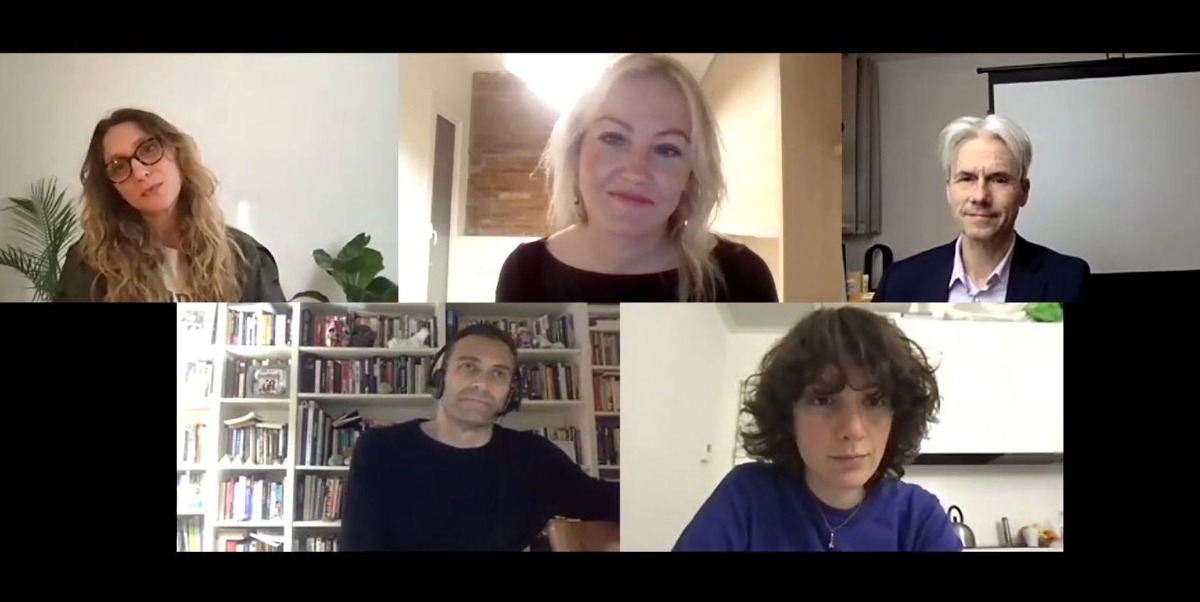
Can Art Heal? Aesthetic Experience as an Antidote to Tiring Times
Panel discussion
According to Kant, the healing power of aesthetic experience lies in the fact that when our imagination and understanding engages in free play, it stirs “the flow of vital juices”, it “elevates the soul.” But what are the practical requirements in order for art to uplift and heal us, and not just be a realm for escape? Is there untapped potential? I asked experts from various fields – from art collector and philosopher to art therapist and clinical psychiatrist – for their insight on this urgent topic.
Participants:
Sveva d’Antonio, art collector at Taurisano Collection Napoli and social media art project curator during the pandemic.
Finn Janning, Danish-born, Barcelona-based philosopher (Existentialism) and mindfulness teacher. He has written three books about artists, including “The Happiness of Burnout. A Case of Jeppe Hein”
Julia Volonts, art therapist from New York who has worked with both “regular” clients and in the contemporary art context in Latvia.
Dr Florian Ruths, CBT and psychiatrist from London who gave the talk “Art as a Psychological Vitamin Complex. The Case of Banksy” in Riga, in March 2020. His book “Mindfulness for Doctors” is due in autumn 2022.
4.45 / Julia Volonts: I use art as a processing tool both as a clinician and artist, my favorite art form being collage. But I was so busy focusing on my private practice and community work during the pandemic, that I didn't have enough time for my own artmaking.
6.50 / Florian Ruths: Art allows me to touch my emotions in a way that heals, and also in a way that they can be held through beauty.
07.55 / Finn Janning: Art can be very helpful in seeing things more clearly: to see that I am stressed or depressed, to see that I suffer from anxiety. But not necessarily giving a solution to how to overcome it and also not looking for the cause of it. Art helps us to explore the symptoms when they appear in our lives.
12.55 / Sveva d’Antonio: I want to be romantic when collecting art. I use art to elevate my spirit and to dream about something that is different.
14.55 / Sveva d’Antonio: For many artists, their studio was like a shelter during the pandemic.
18.30 / Florian: Banksy reminds us of our core emotional needs, some of them being playfulness and spontaneity. His art reminds me of my humanity.
23.25 / Julia Volonts: Art collage is one of the less threatening art therapy forms because it doesn't require skills associated with classical art training.
29.55 / Finn Janning: A real beauty hurts. It can be scary. But if you embrace this anxiety, we can learn more about ourselves.
33.25 Finn Janning: What art and existentialism philosophy has in common is that they both encourage not to avoid the conflict between us and the world, and stay there to learn something new about ourselves.
37.50 / Sveva d’Antonio: Sharing was very important to artists because many of them were producing a lot at the beginning of the pandemic.
39.30 / Sveva d’Antonio: Because many shops were closed during the pandemic, some artists had to learn to create the color for their paintings differently.
47.20 Florian Ruths: I prefer to prepare my emotions for the reception of art by reading and getting to know the context. By connecting to art in an intellectual way, it gives me a different experience.
48.00 / Florian Ruths: Instead of being a means to escape the reality for me, art is a way to connect to reality. My recommendation is: immerse yourself in reality!
49.05 / Sveva d’Antonio: In order to approach art, one has to be curious. Nurture your knowledge about art day by day and it will give you all of it: healing, freedom, power of speech, interesting talks.
53.45 / Finn Janning: There has been a tendency to over-intellectualize art: the idea that you need a certain education in order to interact with an artwork. Being a working-class family boy, I believe in an immediate effect of art.
55.15 / Finn Janning: A consensus about what an art work means doesn’t guarantee the truth. On the contrary, I prefer a dissensus. Not in a hostile way.
56.00 / Finn Janning: Sometimes you don’t need to know much about James Joyce. You just need to jump in and give it a try.
58.00 / Julia Volonts: Playfulness in engaging in art creation can make one confident. You don't need to be an artist in order to create. That is sometimes taken away from us.
1.00.05 / Julia Volonts: Artists are the most fearful of engaging in art therapy because they associate art with a product.
1.02.57 / Sveva d’Antonio: For some artists, art helps to have less anxiety about the world. For others, art makes stress about the product.
1.08.00 / Finn Janning: Besides being an existential form for many artists, art is also business: prestige, status, power. We shouldn’t romanticize it too much.